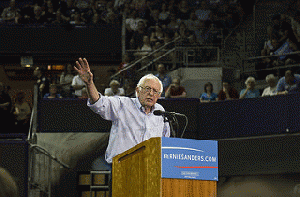Among other things, the current presidential nomination race is providing a major civics lesson for some parts of the American left, many of whom are more accustomed to broad internet polemic than the specific details of practical politics. For much of the Bernie Sanders base, the caucuses, open primaries, closed primaries, delegate selection and the like are all pretty new stuff. One of the facets of the nomination process that seems to be drawing particular attention lately is the question of "superdelegates."
Although the word does not have official status, a "superdelegate" is generally understood to describe a delegate chosen for a presidential nominating convention by dint of present or past party position, rather than because of support for a particular candidate. They were first introduced to the Democratic Party nominating process on the grounds that the increased use of primaries and caucuses, which resulted in the nomination of George McGovern in 1972 and Jimmy Carter in 1976 and 1980, had also inadvertently allowed for the alienation of mainline party politicians from those candidacies. The first class of superdelegates totalled 14 percent of the delegates at the 1984 convention. Today their ranks include all current Democratic governors, members of Congress, members of the Democratic National Committee and a smattering of former officials, constituting about 20 percent of the convention total.
The current story, as it concerns us, is that they support Hillary Clinton by a ludicrously large margin. When Sanders garnered his 11th superdelegate in late December, he had succeeded in cutting Clinton's edge to 32 to 1, down from the 45 to 1 lead she had when the Associated Press first polled the group the previous month and found 359 for Clinton, 8 for Sanders, 2 for Martin O'Malley and 210 unknown and/or undecided. This meant that before a single vote had even been cast, Clinton already had 15 percent of the total number of delegates needed for nomination. In the mainstream press, this has been considered one among many reasons why Clinton was considered such an overwhelming favorite as to make it unnecessary to treat or cover the Sanders effort seriously. And for some critics of Sanders's decision to run as a Democrat, it stood as further evidence of his foolishness, or even treacherousness, in not going it as an independent.
A few points: The imbalance, while staggering, is probably pretty much to be expected. Not only has Clinton made this race before and actually lived in the White House as a First Lady, but let's not forget the basic fact that even though he is seeking the Democratic nomination, Sanders is not actually a Democrat. And not only are the superdelegates supporting one of their own from a partisan point of view, but ideologically the vast majority would undoubtedly more closely match Clinton's profile than that of Sanders. On top of that, until recently the whole Sanders thing probably seemed pretty much of a joke in the circles where the superdelegates travel.
Not so much lately, though. Vice President Joe Biden's remarks, to the effect that it's Sanders not Clinton that people trust on economic justice issues because he's been there for a long time and she hasn't, may just prove to be the tip of an iceberg. If nothing else, the superdelegates are there because they know how to win elections. And they, like the rest of the nation, are slowly waking to the fact that just as they didn't see the Great Recession coming and they didn't see the Occupy movement coming, they missed the Sanders phenomenon too.
Until recently the desires of the superdelegate types to not look bad and not lose the White House were playing entirely in Clinton's favor. Eventually, however, they're not going to keep ignoring polls that show Sanders running stronger against potential Republican candidates than Clinton. The conventional wisdom that Clinton would have to be the stronger candidate because she was more the centrist is starting to give way to the understanding that it may be Sanders who holds the greater appeal to independent voters because of his, well, independence. Likewise the idea that it would be Sanders who would prove the dangerously divisive candidate by running a stridently left wing campaign is fading before the sight of Hillary, and now Chelsea Clinton, doing the Republicans' dirty work by consciously and cynically distorting the facts of the Sanders Medicare for All proposal.
While it would seem foolish and naive to think that a majority of the superdelegates will ever swing Sanders's way, it's also worth remembering that this group has yet to prove decisive -- that is, no candidate who has won the bulk of the elected delegates has been denied the nomination by those who were not elected. Could this be the first time it happens? Of course. But really, let's not get ahead of ourselves. Recent poll surges notwithstanding, the idea of Sanders actually winning the nomination is absolutely still a serious longshot. We should be so lucky as to get to a point where we find the superdelegates being the only remaining barrier to the nomination!
They are a potential hurdle, to be sure. But when you consider the money and media advantages Clinton has enjoyed, it's hardly obvious that they constitute the biggest obstacle that the Sanders campaign has faced. Besides, if we fail to understand that entrenched forces will attempt to block us at every turn, we don't belong in politics.






